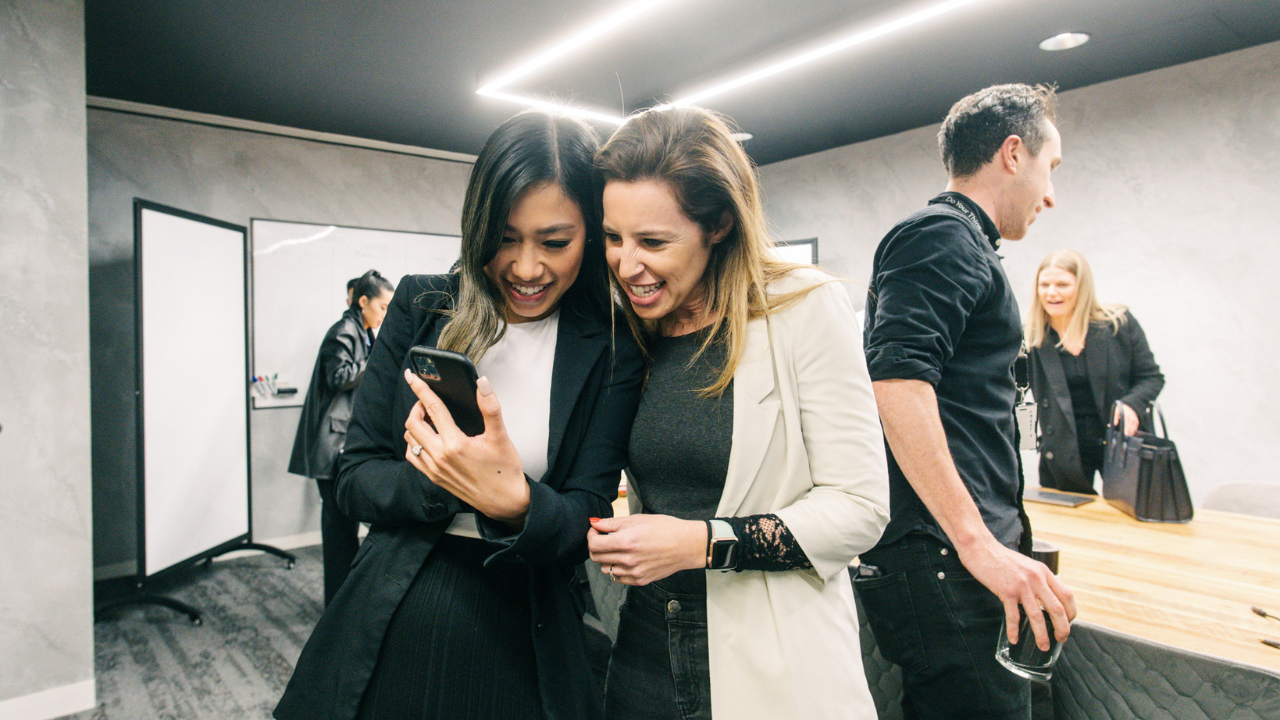What We’ve Been Getting Wrong About The Future of Work
We’re facing some of the most challenging market conditions that organizations have had to operate in for some time. Leaders are trying to figure things out like hybrid working and the flexibility frontier, the impacts of generative AI, the re-skilling revolution, the wellbeing hangover from the pandemic, and a reframe around employee attraction and loyalty. The thing is, society is moving at an unprecedented pace that we’re evolutionarily not equipped to deal with. And when things move so fast, we can often make mistakes.
The Future of Work is no exception. It’s a little bit like the last season of Game of Thrones. It was exciting. Everyone was talking about it. And it had a lot of potential. But there’s also some stuff that the show just got plain wrong – Between the terrible lighting during the Battle of Winterfell to Daenerys’ character arc… Actually, don’t get me started.
This article is all about what we’re getting wrong when it comes to the Future of Work. It calls out some of the common misconceptions and misunderstandings so that we can start to have the right conversations that lead to better outcomes for organisations, teams, and workers.
Beyond the Debate: Working towards hybrid harmony
No matter what day of the week you read the newspaper, there’s some landlord or CEO telling people that they need to come into the office. And I’ve heard all manner of reasons. Let’s explore some of the main ones:
- “You’re more productive working in the office”. In the earlier days post-lockdowns, this was the most popular reason floating around. But the US Bureau of Labor Statistics disproved it pretty quickly, showing that productivity drops when people go into the office. Why? Because technically, if productivity is output over time, they’re not being productive – they’re not sitting on their laptops in an office churning through work. Instead, they’re workshopping, connecting, collaborating, and building relationships.
- “If you can work from home, then a robot can do it instead and your job will be automated”. This is just stupid and I won’t even give it the energy to go into all the reasons why it’s wrong.
- “You need to come into the office because you need to build relationships in person”. I wonder how all the Gen-Zers feel, who have grown up playing video games talking to their best mates through their headsets, many of whom they’ve never actually met in person. Sure, back in your day, maybe that’s how relationships were made, but change is afoot.
Don’t get me wrong, the office is important. In fact, I believe that it’s more important than ever and plays a valuable role. And sure, there are people that need to get out of their pajamas and go in more. It’s a bit like junk food – you may like it, but you don’t eat it every day. And the same goes with working from home.
But all these news articles and mandates are doing is creating an adversarial relationship between the home and the office. One is better than the other, so which one is it? Really, what we need to be focusing on is the manner in which they compliment each other and the best solution is both. The home is better for deep thinking, administration, research and writing. While the office is better for connection, collaboration, forming networks, and building psychological safety.
So, when we talk about hybrid, don’t talk about how the home or the office is better than the other. Focus on the benefit and intersection of both. And the premise that we come together in person so we can work better apart.
Oh, and while we’re at it dispelling myths, cupcakes and yoga classes aren’t going to cut it.
Flourishing in flexibility
If ‘unprecedented’ was the buzzword during the pandemic then ‘cost of living crisis’ is the phrase du jour. And rightly so. In a study by Officeworks, it was found that the top thing sought after by employees was salary, followed by work-life balance and flexibility. But in a market where organisations can’t fork out pay rises to meet the uplift in household expenses, work-life balance and flexibility move from a must-have to a nice to have. And it’s not just for working parents as the common misconception goes. In fact, 59% of Gen-Z jobseekers who were offered a job in the last twelve months turned it down because they weren’t satisfied with the flexible working provisions, which is more than any other generation. Despite this, one third of Australian organisations still don’t have a flexible working policy and haven’t quite grappled with how much of an important factor it is in attracting and retaining top talent. Sounds like a bit of a quick win if you ask me.
Silent Leadership: The deafening consequences of not listening to your people
Whether organisations are considering ways to tighten the purse strings, embed flexibility, or work through their employee value proposition, there’s a lot of conversations being had, policies being made and directives handed out. The issue is that they all lack one thing – They don’t actually engage or are informed by the people they impact. Take a really simple and arguably trivial example – free coffee. Some companies have either stopped offering this or reduced the hours it’s available to employees. Now, for the senior executives on big pay packets who don’t take advantage of this, it’s no biggie. But for the juniors where it’s a major incentive for coming into the office, or who use it to get their morning caffeine hit, or take that microbreak from work and chat to their colleagues, it’s a big loss.
Otherwise, take the organisations mandating office attendance. I’m not saying coming into the office isn’t important. But it’s again made from the perspectives of leaders who more often than not drive into work, park in the building, and for whom money isn’t as much of an issue. But in a cost of living crisis, the number one reason employees actually like working from home is because of the money they save.
So, let me make it loud and clear. Engaging and hearing from the people your decisions directly affect has never been more important. No more captain’s calls.
Coworking Catalyst: The missing ingredient
When we think about coworking, it often conjures up images of tech startups with kids in black tshirts sitting around empty pizza boxes. But what is playing out with coworking is a different story. Because what many operators, like CreativeCubes.Co, are finding is that it’s not that employees don’t want to return to the office again. It’s that they don’t want to return to your office.
Hear me out. When it comes to heading into the office, often in CBDs, you factor in the commute, cost of travel and city crowds before you arrive at your floor which, for many, has not been redesigned to suit the needs of modern work and new ways of working. So, people opt to work from home where they can. But a study cited in the Harvard Business Review found that while employees like the freedom and flexibility that remote working provides, they don’t necessarily like working from home all the time either. It’s similar to a PwC survey that found Australian workers reported a massive uplift in their mental health with working from home, but over two in five regularly experienced loneliness and isolation. That’s where coworking is positioning itself to fill the gap. It’s often closer to home, the design is fit-for-purpose, it provides choice, and not only do you get to have flexibility in where you work, but who you work with too.
- Automation Apocalypse: Rise of the machines
Cue the ominous music and dramatic voiceover as we ponder the rise of automation, fearing that robots and AI will take our jobs faster than Ross can say “we were on a break”. There’s a lot of fear when it comes to automation. We’ve even seen the likes of Elon Musk and Apple co-founder Steve Wozniak call for a pause on AI development because it’s just. too. fast. And I get it. There’s a lot happening and a lot of unanswered questions.
The thing to remember with automation is that it’s tasks that get automated, not entire jobs. Sure, some jobs may no longer exist in the future, but that number is small. Rather for most, there will be parts of their role that get automated, or that AI can do instead, which means that our roles will evolve. Take the ATM, for example. When they were rolled out, people feared it would be the end of bankers. Instead, the number of bankers has only increased, it’s just that rather than simply dispensing cash, they’re talking to you about your home loan or managing your finances. Or take the calculator, which was expected to hit the accounting profession hard. I don’t know about you, but just having a calculator doesn’t make me an accountant. And it’s not like it meant I didn’t have to study maths at school either. It actually meant I had to do more complicated maths because I had this incredible tool at my disposal. So, when it comes to automation, think about how it could actually help you to be more effective in your role. And when you consider AI, think of it as your universal intern to free up some of your capacity for more strategic activities.
Corporate is (not) king
When it comes to where graduates want to work, we often think of big businesses with wide reaching career pathways. But the tides are changing. In the recent rankings of top graduate employers in Australia, none of the major banks made it in the top 20 and only one of the Big Four accounting firms (Deloitte) cracked the top 75. What’s happening here is that those entering the workforce have a different idea about what they want from work. It’s not about a paycheck, nor is it about sacrificing the best years of your life to climb the corporate ladder. Instead, they’re looking for organisations that prioritise work-life balance and wellbeing. And more than anything, they don’t want to be consumed by a big system. Instead, they want to be doing a role where they can see the value of their contribution and the impact that their work is having. What we’ll start to see is big businesses start to position themselves as more entrepreneurial, agile and socially responsible, but it will be a large mountain to climb, especially if it’s not done authentically.
Where to from here?
When it comes to the Future of Work, it can sometimes just be a form of executive entertainment that doesn’t lead to much action. The reality is that the Future of Work is progressively feeling like it’s right on our doorstep and sitting still is no longer an option. Before we act though, it’s important that we make sure we’re calling out those bits that we’ve gotten wrong about the Future of Work so we can work towards better ways of working. And it comes down to valuing hybrid working in its truest sense, recognising that flexibility is more than a nice-to-have, engaging your people about the decisions that directly impact them, considering coworking in your property strategy, embracing automation and AI, and responding to the changing needs of emerging generations.
And just for the record, Ross was right – they were on a break.




